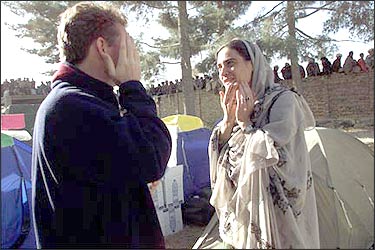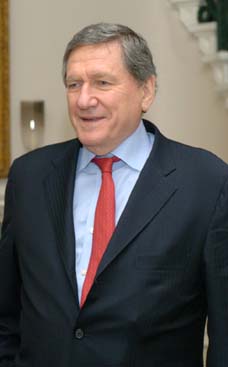
As President Obama unveils his Afghanistan strategy, he should know that a flurry of warnings by U.S. officials urging lowered expectations has not fallen on deaf ears in Afghanistan. "I guess we were wrong to hope for anything really new from the new American government," sighed one of the members of my cooperative as we peeled Chinese pears recently by the light of kerosene lamps. So when Obama said recently that there were no plans on tap to "rebuild Afghanistan into a Jeffersonian democracy," or when Defense Secretary Robert M. Gates said the aim wasn't to create "some sort of Central Asian Valhalla over there," my colleagues were listening. Such formulations have the effect on Afghans of a cold shower. And without the energy and commitment of the Afghan population, even the narrowest of U.S. goals in Afghanistan -- denying sanctuary to international terrorists -- will not be achieved. Morocco RPCV Sarah Chayes has made a home in Kandahar, Afghanistan, became fluent in Pashto, one of the main Afghan languages, and devoted her energies to rebuilding a country gutted by two decades of war.
0,869368.story, Sarah Chayes writes: 'Lower your sights' is the wrong vision for Afghanistan
Lower your sights' is the wrong vision for Afghanistan
As U.S. officials talk down our goals, Afghans are listening and wondering what happened to our promises.
By Sarah Chayes
March 27, 2009
Writing From Kandahar, Afghanistan -- As President Obama unveils his Afghanistan strategy, he should know that a flurry of warnings by U.S. officials urging lowered expectations has not fallen on deaf ears in Afghanistan.
"I guess we were wrong to hope for anything really new from the new American government," sighed one of the members of my cooperative as we peeled Chinese pears recently by the light of kerosene lamps.
I tried to reassure him. The declarations were just politics, aimed at a domestic audience, I said. Hadn't Obama declared Afghanistan his top international priority? Wasn't he assigning the most talented U.S. officials to the problem? Wasn't he sending more troops? My colleague, with a jaded glance, handed me a slice of pear.
We make soap, 14 of us: Afghan men and women and, when I'm in Kandahar, me. We use the fragrant and pungent bounties of this forbidding land in our products, and we struggle with government corruption, the chronic lack of electricity and the constraints of trying to run a factory in an active theater of war. The dynamics have forged my cooperative members -- few of them literate -- into sophisticated political analysts.
So when Obama said recently that there were no plans on tap to "rebuild Afghanistan into a Jeffersonian democracy," or when Defense Secretary Robert M. Gates said the aim wasn't to create "some sort of Central Asian Valhalla over there," my colleagues were listening. Such formulations have the effect on Afghans of a cold shower. And without the energy and commitment of the Afghan population, even the narrowest of U.S. goals in Afghanistan -- denying sanctuary to international terrorists -- will not be achieved.
The exaggerated rhetoric the new administration seeks to puncture was prevalent only for an instant, through the early months of 2002. Already by the summer of that year, my Afghan and international colleagues were wondering what had happened to the promised U.S. attention. Eventually, we realized that it had been reallocated to Iraq. Ever since, Afghanistan has struggled against the effects of drastically lowered expectations.
This scaling back was a signal failure of the Bush administration, as Obama noted often during his run for president.
But now, despite proven results in Iraq from the shift in approach that accompanied the "surge," some in Washington seem to be reaching again for the simplistic formulas of six or seven years ago. "After all," I have heard officials suggest, "our real national security interest in Afghanistan is only the eradication of bases for transnational terrorism. Why not just focus on destroying those bases and leave the rest alone?"
But that was precisely the Bush administration's policy. From the start, Afghanistan was treated as a narrow counter-terrorism operation. The ironic consequence of that choice was the expansion of the potential sanctuary for terrorists from a few mountaintops on the border with Pakistan in 2002 to an area covering nearly half the country today.
To pursue its anti-terrorism goals, the U.S. military relied on Afghan proxies it recruited from the ranks of warlords the Taliban had driven from the country in 1994. It was one of the few acts for which the Taliban was still hailed. In return for these thugs' service in the anti-terror campaign, we armed them, financed them and installed them in positions of political power, in some cases against the wishes of President Hamid Karzai. The U.S. preoccupation with narrow anti-terrorism goals caused us to ignore all aspects of how these men governed.
What ensued has been a free-for-all of corruption and abuse of power, with ordinary citizens paying the price. Our cooperative, for example, recently imported some solar energy equipment, which we needed because of the ongoing lack of electricity in Kandahar. We had to pay about $1,200 in bribes at seven different checkpoints on the road from the Pakistani border and at the Kandahar customs house. Judicial decisions are bought and sold, as is public office. Driver's licenses, death certificates and electricity meters come with a heavy surcharge. Lucrative contracts are monopolized by power brokers. The corruption infuriates ordinary Afghans, who do not see such abuses as part of their culture.
The result has been that a country that in 2002 enthusiastically welcomed the young government of Karzai and the international presence is now turning back to the Taliban. This is not out of affinity or ideological bent but because -- as was the case in 1994, when the Taliban first arrived on the scene -- it represents a practical alternative to the reigning chaos.
"Reconciliation" is a word that has abruptly come into vogue -- with Karzai and with some U.S. officials and experts. But it is absurd to think that an Afghanistan partly or wholly given over to some imagined "moderate" Taliban would not in short order turn back into a sanctuary for international terrorism. Promises that the Taliban might make in the process of gaining a deal would not be worth the paper they were written on. And a population disgruntled by the havoc, waste and corruption that has characterized the international presence will prove vulnerable to the enticements of Al Qaeda recruiting sergeants.
The answer is not to lower the bar but to raise it. What is needed is some of that patented Obama "Yes, we can!" energy.
We can, for example, work to ensure not just the security of the upcoming Afghan elections but a modicum of integrity, by observing, reporting and sanctioning instances of abuse and by distancing ourselves from those Afghan officials illegally exploiting their offices to ensure a Karzai reelection. We can insist on accountability on the part of Afghan officials, especially regarding the expenditure of international funds. We can help Afghans give teeth to what is perhaps the most important feature of American democracy -- one that was signally ignored by the Bush administration's Afghan design: checks-and-balances mechanisms.
Additional troops are desperately needed, and they should be deployed to protect the population rather than focused on hunting high-value targets or trying to seal off Afghanistan's borders. Development assistance, well targeted and monitored, is also crucial. But only with a concurrent full-court press on governance can the most limited U.S. goals in the region be accomplished.
The sudden appetite for Afghanistan in Washington, and the real attention being devoted there, allows me to argue to my cooperative members that the "lower your sights" rhetoric is just that -- rhetoric. This time, I try to assure them, our actions will outstrip our words. May I be telling the truth.
Sarah Chayes runs the Arghand Cooperative in Kandahar and advises the commander of NATO troops in Afghanistan.











